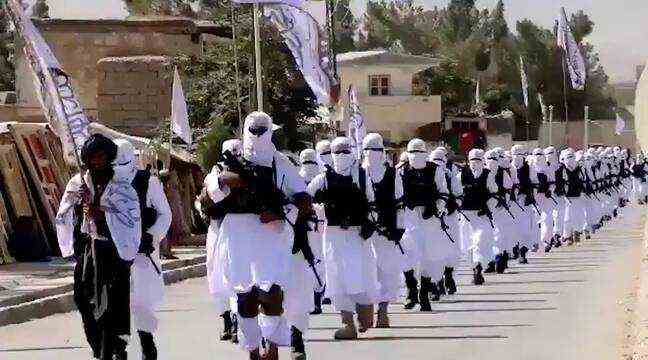More than three weeks after taking power in Afghanistan, the Taliban unveiled their provisional government on Tuesday evening, but their political program is still very vague.
Their supreme leader, Hibatullah Akhundzada, in a very rare public intervention on Tuesday, however, insisted that the government would have the task of upholding Sharia, Islamic law.
Womens rights
This is the area in which the Taliban are most eagerly awaited and which could condition their recognition by the international community, essential in particular for the resumption of economic aid, on which the country strongly depends and which has been largely suspended. Their first stint in power between 1996 and 2001 was notably marked by the disappearance of women from public space. The Islamists have multiplied the gestures and declarations since August 15 to try to reassure on this point, affirming that the rights of women would be respected in accordance with Sharia law.
They announced that Afghan women could study at university, but in single-sex classes, and with abaya (traditional long garment) and niqab (veil covering all the face except the eyes) compulsory. They will also be able to work, but “in accordance with the principles of Islam”. Under their previous regime, women were not allowed to work or study, with rare exceptions. The absence of women in the provisional government, however, is a bad signal. Unknowns also remain on the right of women to go out in the street without being accompanied by a man, which was prohibited by the Taliban in the 1990s, or on the obligation to wear the burqa (thick veil covering the body and hiding the eyes).
Hurry
The Taliban assured that journalists, including women, could continue to work freely and would not be harassed. “We will respect the freedom of the press because the information will be useful to society and, at the same time, will allow the errors of the leaders to be corrected,” their spokesperson, Zabihullah Mujahid, told Reporters Without Borders.
Statements which for the moment are struggling to convince. Many journalists have already left the country when others remain in hiding at home for fear of reprisals. Some were briefly arrested on the sidelines of recent protests against the regime. Mr. Mujahid called on the media “not to cover” these demonstrations, deemed “illegal until the laws are proclaimed”.
Culture
During their first experience of power, the Taliban applied a strict version of Sharia law, banning games, music, photography and even television. “Music is prohibited by Islam, but we hope to convince the Afghans not to do these things, rather than force them,” Zabihullah Mujahid recently reaffirmed in New York Times.
Residents and members of the ousted government, however, accused the Taliban of having murdered a folk singer in Andarab (northeast) at the end of August, information that AFP could not confirm. On heritage, a source of concern since the destruction of Buddha statues by Islamists in Bamiyan in 2001, the movement has not made any official statement since February, when it showed its desire to preserve it.
Economy
This is one of the most pressing challenges the new regime will have to tackle. The Afghan economy has emerged bloodless from decades of war and the suspension of international aid threatens to plunge the country into economic and humanitarian catastrophe. The Taliban program remains very vague at this stage. “Interactions with the international community, with other countries, will continue,” their spokesperson simply said. “We will work on our natural resources to revitalize our economy, for our reconstruction, for our prosperity,” he added without giving further details.
It is still unclear at this stage how the Taliban will manage to find funds to pay civil servants’ salaries and keep vital infrastructure (water, electricity, communications) in working order. The Taliban’s current income, which comes mainly from criminal activities, is estimated by the UN at between $ 300 million and over $ 1.5 billion per year. A financial windfall that is a drop in the face of the current needs of Afghanistan, according to experts.
Security / Drugs
The Taliban have warned that any insurgency will be “severely suppressed,” a message to resistance forces in Panchir. They also assured that they would eradicate the local branch of the jihadist group Islamic State, which still constitutes a serious threat, without giving more details.
As for drugs, Zabihullah Mujahid said the new authorities would not turn the world’s largest producer of opium into a real narco-state. “We assure our compatriots and the international community that we will not produce drugs,” he said.
Sport
Under their first government, certain sports were allowed, but they were strictly controlled: only men could play or attend matches. According to the latest Taliban statements, women should still not be allowed to play sports.
“They could be faced with a situation where their face and body will not be covered,” Ahmadullah Wasiq, a Taliban official, told Australian media SBS News on Thursday about the cricket case. “Islam does not allow women to be seen like that”.

